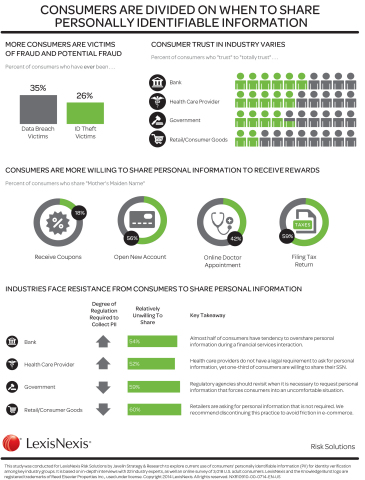ATLANTA--(BUSINESS WIRE)--LexisNexis® Risk Solutions released today a landmark study spotlighting why industries collect, store and use PII (personal identification information) and what impact this makes on identity verification and consumer behavior.
LexisNexis surveyed more than 3,000 consumers about their willingness to provide their PII in low, medium and high risk transactions in four industry segments. The study also includes in-depth interviews with executives in financial services, health care, retail and government to better understand the current use of PII for identity verification. Key results from these four sectors include:
- Financial Services: Despite their view that more data is better for security, many banking experts hope to reduce the amount of PII they must collect and subsequently store. Consumers have a high level of trust with financial institutions; 60 percent of consumers surveyed say they are very willing to share PII with banks, credit unions and other financial institutions.
- Health Care: Healthcare industry experts acknowledge their collection of Social Security Numbers is being driven by the requirements of patient record management systems, rather than compliance with industry regulations. Balancing fraud mitigation and privacy concerns is proving difficult. Health care organizations must collect and secure sensitive PII from their patients, some of whom do not wish to share this information in the first place, increasing liability in the case of a data breach.
- Retail: This industry faces the greatest challenge among businesses in all examined sectors when soliciting PII from consumers. Due to data security and fraud concerns, consumers express the least willingness to share PII with retailers. Some industry experts believe the proliferation of data breaches and recent revelations about the compromise of online privacy have decreased willingness among consumers to share PII. The study shows that 26 percent of consumers have been victims of identity theft, more than half (54 percent) are concerned that they will be victims in the future. Only 17 percent of consumers state they are very willing to share PII with the retail industry.
- Government: Despite the media attention on data breaches, consumers place a high amount of trust in government institutions when it comes to sharing PII. This is the only industry in which consumers express a high level of willingness to share their Social Security Numbers — particularly in high-risk scenarios. Likely due to having been conditioned to expect to provide this information when filing their federal tax returns, 71 percent of consumers report they are very willing to share their Social Security Number in this scenario.
“Incidents of data breaches and identity theft have become pervasive threats to consumer trust,” said Dennis Becker, LexisNexis Risk Solutions Vice President. “Organizations need to be cognizant of how consumers’ fears and experiences affect their willingness to share sensitive data and seek ways to minimize the amount of personal information being requested.”
Methodology
Industry data cited in this white paper is primarily based on in-depth interviews with 22 industry experts working in financial services (banking industry), health care (payers and providers), government agencies and retail.
Consumer data is based on a 20-minute online survey conducted in December 2013 among 3,018 U.S. adult consumers. Respondents were presented with questions to determine their willingness to share various PII under different scenarios, by industry. Each of the respective scenarios, in which the identity of the consumer must be verified, represents different overall levels of risk (i.e., compliance and fraud risk) to organizations in each industry.
About LexisNexis Risk Solutions
LexisNexis Risk Solutions (www.lexisnexis.com/risk/) is a leader in providing essential information that helps customers across all industries and government predict, assess and manage risk. Combining cutting-edge technology, unique data and advanced scoring analytics, Risk Solutions provides products and services that address evolving client needs in the risk sector while upholding the highest standards of security and privacy. LexisNexis Risk Solutions is part of Reed Elsevier, a leading publisher and information provider that serves customers in more than 100 countries with more than 30,000 employees worldwide.




